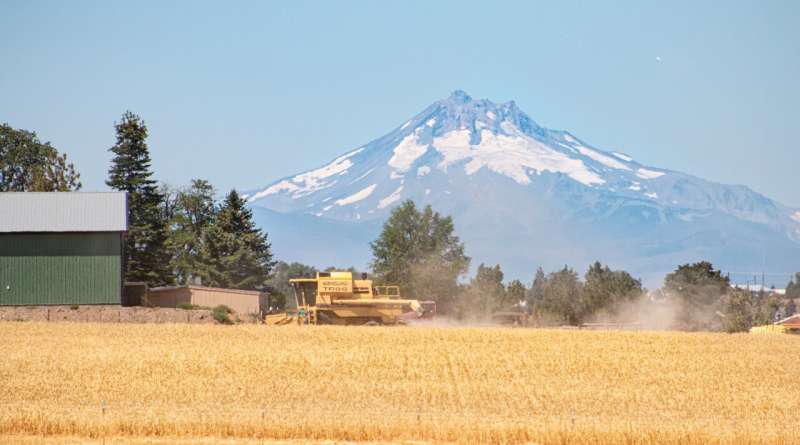Credit: Unsplash/CC0 Public Domain
A new UO study, which was recently shared with the U.S. secretary of labor, shows that COVID-19 has caused long-term economic, social, physical and mental health challenges for farmworkers in Oregon.
Professor Lynn Stephen, a Philip H. Knight Chair in anthropology and Distinguished Professor of Arts and Sciences, helped lead the study and, specifically, the examination of farmworkers' mental health. She brought it to the attention of Secretary of Labor Marty Walsh when he visited with UO faculty experts and university leaders about farmworkers and their employment conditions.
"The opportunity to meet with U.S. Secretary of Labor Marty Walsh was an amazing opportunity," Stephen said. "Our study has focused not only on research findings, but also on concrete recommendations and strategies to alleviate the problems we documented."
The Oregon COVID-19 Farmworker Study highlighted the final findings from a survey of 300 Oregon farmworkers and offered policy recommendations to help address the harm the virus has caused farmworkers and their families. The effort was the first statewide assessment of how COVID-19 has affected Oregon farmworkers. The study was conducted by the UO and other institutions and organizations across the region.
"The state's farmworker population, a majority of whom are Latino or Indigenous peoples from Mexico and Guatemala, experienced disproportionately higher rates of COVID-19 infections than people from other ethnic and racial backgrounds and labor sectors," the group wrote in a press release. "Many face economic, social, physical and mental health challenges without adequate safety nets and protections. Recovering from the pandemic requires immediate and deliberate attention to farmworkers' safety and well-being at work and home."
The survey showed that farmworkers struggled with mental health challenges triggered by things like the loss of income, inability to pay bills, disruption of the financial help they send to relatives in their home communities, and difficulties providing education to children at home during the pandemic. Many farmworkers reported symptoms related to anxiety, stress and depression, but the majority of respondents also reported that they have no access to mental health treatment.
"Sadly, 91 percent have no access to mental health services," Stephen said. "All of this is borne on the backs of people who are putting food on our tables."
UO linguist Gabriela Perez Baez and graduate student Tim Herrara also contributed to the study.
The large community of Indigenous farmworkers reported that they had to deal with language barriers in accessing things like COVID-19 safety information and schooling materials for their families as most things were only available in English and Spanish. Farmworkers in Oregon speak more than 20 Indigenous languages.
The survey also highlighted the lack of adequate safety measures or conditions to control farmworkers' risk of contracting and spreading COVID-19, especially in the workplace. Despite being well-informed about COVID-19 and doing their best to control conditions at home, workers reported that employer demands made it difficult to practice social distancing and other safety measures while at work.
Farmworkers also faced many barriers to testing and quarantining due to crowded living quarters and fear of losing income and work.
The estimated 174,000 farmworkers in Oregon have seen disproportionate infection rates, the report says. Latinx farmworkers have accounted for approximately 24.2 percent of COVID-19 cases in Oregon, despite representing only 13 percent of the population. And the Oregon Health Authority has regularly reported agricultural worksites and food packing facilities with higher rates of infection and places more vulnerable to spread of the virus.
The group of 11 organizations offered 14 policy recommendations to help farmworkers and their families.The list also aims to address the longstanding disparities that existed long before the pandemic and were exacerbated as it progressed.
The recommendations include initiatives like culturally informed mental health support, financial help for child care, income support available to workers in the country legally or illegally, stronger safety regulations in workplaces and more communication about vaccines and testing in Indigenous languages.
"We exchanged ideas with Secretary Walsh on reforming immigration policy to bring relief to the undocumented farmworker population and others, improving working conditions, extending COVID-19 worker safety rules and establishing permanent smoke and heat regulations for farmworkers, expanding overtime pay for farmworkers, providing information and access to services for farmworkers in the 26 Indigenous Mesoamerican languages they speak in Oregon, and working to build stronger protections for workers," Stephen said. "The ability to share our study results at such a high level was inspiring, and I look forward to continued exchanges with Secretary Walsh."
In another related study, a UO sociology doctoral candidate conducted similar research in rural Washington, looking into the experience of immigrant and refugee food processing workers during the pandemic. Lola Loustaunau conducted 40 in-depth interviews with workers in Eastern Washington, which has many food processing facilities and cases of COVID-19, and analyzed news from agencies and the media to examine the issue.
Loustaunau found that the workers also faced a myriad of challenges introduced or exacerbated by the pandemic. Their working conditions made it difficult to practice physical distancing and they had limited access to personal protective equipment and other safety measures.
They also faced language barriers to information about benefits and assistance and felt pressured to continue working, even if they had symptoms or had a sick family member at home. And, like farmworkers in Oregon, they have not had access to affordable mental health care to help them cope with the added stress and mental toll of the pandemic.
Provided by University of Oregon






















